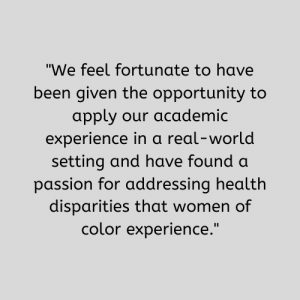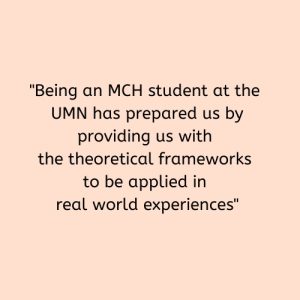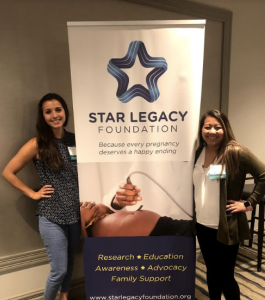MCH students Morgan Collins and Mai Vue reflect on their internship with the Star Legacy Foundation.
What is the Star Legacy Foundation and how did you get involved?
The Star Legacy Foundation is a non-profit organization that is committed to reducing pregnancy loss and neonatal death and improving care for families who experience such tragedies. Star Legacy is a community of families, health professionals, researchers, policy makers, and individuals dedicated to helping every pregnancy have a happy ending.
What projects have you been on or currently working on?
Mai: Morgan and I are interns working with Star Legacy on their Pregnancy Research Project. The project is designed to allow women who have had a baby in the last 15 years (regardless of outcome) contribute to the information about that pregnancy to science. The second arm is a maternal survey to document aspects of the pregnancy that are not reflected in the medical records. This information will allow researchers to utilize this data set without the time and expense of recruiting their own data. I am working on analyzing MN fetal death data and identifying women and populations at higher risk, to ensure that they are represented in the project data set. Additionally, I work with the Executive Director, Lindsey, to create a plan of action to recruit these women into our study. I’ve also worked with Morgan on collection fetal death information from other states.
Morgan: I have been analyzing 2017 fetal mortality data provided by the CDC and presented an analysis at the Stillbirth Summit to a group of researchers in June. I am also creating powerpoint presentations for the executive director to present at a Stillbirth meeting in Fall 2019. Later on this summer, I will be creating fact sheets that will be used to educate the public on fetal mortality rates and trends as well as demographics and characteristics that put mother and fetus at risk for stillbirth.
 What is the Stillbirth Summit, and could you share your experiences (preparation, research presentation topic..)?
What is the Stillbirth Summit, and could you share your experiences (preparation, research presentation topic..)?
The Stillbirth Summit is an annual three-day conference held in June, focusing on stillbirth research and prevention. Internationally acclaimed researchers share their passion for ending this adverse pregnancy outcome. This event was open to the public and audience members consisted of bereaved families, medical professionals, world-renowned researchers, community based organizations, state representatives, policy and legal experts, and students.
On the last day a presenter panel was held for the audience to ask additional questions on topics covered at the conference. During the last half of the panel, audience members and researchers discussed next steps moving forward on stillbirth research and advocacy to improve maternal care and eliminate the stigma of fetal death.
How has being an MCH student at UMN helped you prepare for this internship?
Being an MCH student at UMN has prepared us for this internship by providing us with the theoretical frameworks to be applied in real world experiences. Through our epidemiology and SAS courses, we learned ho w to calculate and analyze fetal death rates, which contributed to the work that we’ve done at Star Legacy. Additionally, our coursework and experiences have prepared us for working with other Public Health professionals in the field and acknowledging the impact health disparities have on our communities.
w to calculate and analyze fetal death rates, which contributed to the work that we’ve done at Star Legacy. Additionally, our coursework and experiences have prepared us for working with other Public Health professionals in the field and acknowledging the impact health disparities have on our communities.
What is your biggest takeaway from this experience?
Interning for Star Legacy Foundation has helped us both realize the need for extensive fetal mortality research. Furthermore, it has exposed us to systemic barriers pregnant women encounter within healthcare and community settings. We feel fortunate to have been given the opportunity to apply our academic experience in a real-world setting and have found a passion for addressing health disparities that women of color experience.
Mai Vue is a MN born and raised, first generation Hmong American college student. She received her BA in Biology, Society, and Environment, with minors in Anthropology and Public Health from the University of Minnesota Twin Cities in 2017. She is currently a third year MPH student in the Maternal and Child Health program, with minors in Epidemiology and Global Public Health. Her academic and research interests are in women and children’s health, immigrant and refugee populations, medical anthropology, and global health. In the future, Mai hopes to work closely with these communities to ensure coordinated and comprehensive care to eliminate health disparities.
Morgan Collins is a Minnesota native and graduated from the University of Minnesota Twin Cities with a BS in Elementary Education. After graduating, she worked in early childcare education for 6 years and worked mostly with infants between the age of 3 months to one year. She eventually met a mother from the childcare center who had her MPH in Maternal and Child Health, where she learned about the field. She immediately knew this was the path she wanted to take, and now she is currently completing her second year in the MCH Program, with an emphasis in Epidemiology. Morgan’s interests are fetal and infant mortality as well as understanding health disparities among Native American/Alaska Native women, infants and children.
Interested in learning more about getting a degree in Maternal and Child Health? Visit our MCH Program page for more information.
#UMNMCH #UMNproud #UMNdriven
